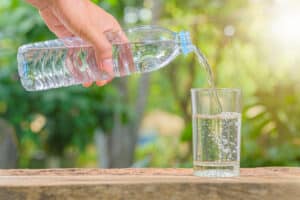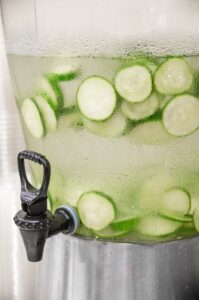Eating Well, Aging Well: Nourish with Fluids
Do you drink the recommended amount of fluids everyday? Do you have a beverage with every meal? If not, you could be at risk for dehydration, which is a serious health condition that involves the loss of bodily fluid.
Nourishing Your Body with Fluids is the second segment to our six part series of Eating Well, Aging Well. Whatever your current drinking routine is, we have plenty of tips on how to stay hydrated.
Importance of Fluids
Eating well to age well is all about a well rounded diet, which includes consuming fluids. Water helps to regulate your body’s temperature and is important for joint health and protecting the spinal cord and other sensitive tissues. Water helps get rid of waste, through urination, perspiration and bowel movements.
 The first early sign of dehydration is thirst. Feeling thirsty indicates you total body water has decreased by 2-5%. Water is an essential nutrient! About 55-60% of your body is fluid, so it’s important to stay nourished before becoming thirsty.
The first early sign of dehydration is thirst. Feeling thirsty indicates you total body water has decreased by 2-5%. Water is an essential nutrient! About 55-60% of your body is fluid, so it’s important to stay nourished before becoming thirsty.
Staying Ahead of Thirst: Preventing Dehydration
Dehydration is more common than you realize. You may be experiencing symptoms without knowing. Many older adults often struggle to sense thirst. As you grow older, your body composition changes. Your body retains less water than when you were a young adult, putting your health at an increased risk.
Reduce your risk by actively preventing dehydration. Knowing when your body needs more water helps you to prevent dehydration. For example, you should increase your water intake when you are in hot climates, physically active and are sick with a fever, diarrhea or vomiting. For a healthy diet and body, make efforts to increase your fluid intake.
Commit to Consuming More Fluids
According to The U.S. National Academies of Sciences, Engineering and Medicine, men should drink about 15.5 cups of fluids a day and women should drink about 11.5 cups a day. After making a commitment to drink more often, record how much you are drinking to monitor your progress. You can set goals for how often you should refill your drink throughout the day (e.g. once before lunch, twice before bed). To keep yourself on track, try these simple tips:
- Keep your beverage within reach.
Whether you are watching TV, going for a walk, working around your home or performing some other activity, you will be more mindful about drinking if you have a beverage near you. On hot outdoor days, consider freezing part of your beverage in a freezer safe bottle. After it has frozen, fill the rest the rest of the bottle with more of your beverage; therefore, you have a nice cool beverage to relieve you from the hot sun. - Use a beverage bottle.
Using a beverage bottle will help provide consistency of the amount to fluids you drink. For example, if you use a 16 ounces bottle, you will know you have consumed 16 ounces every time you finish drinking its contents. There are even bottles that have pre-printed fluid guides to help you measure the amount of fluid you consume. - Finish your drink with meals.
Fill your cup before every meal. Taking a few sips of your beverage between each bite will help nourish your body while also filling you up and reducing your craving to consume more food. When you are eating out, order water. Not only will it help you save a little money, but it will also help increase your water intake. And, if you’re still looking for a little extra flavor, order water and a soft drink.
 Choose Your Beverage
Choose Your Beverage
Any kind of fluid will help nourish your body, though water is the best fluid source for your body. Choose from a variety of beverage options so you can alternate throughout the day.
Lower calorie drinks, like fruit infused water, sparkling water, seltzers, coffee and tea, are great options to keep around. Just make sure to not consume too much caffeine as it may dehydrate you, and try to avoid high calorie beverages with no nutritional value including sugary drinks, alcoholic drinks, caffeinated drinks, sport drinks and drinks with sugar alternatives. If you do want a drink with calories and nutrients, low fat milk and fruit and vegetable juices are the way to go. Fluids also include soup and high water content foods, such as fruits and vegetables. If you don’t want a cold beverage, try a warm bowl of soup.
Once you consume fluid, your body uses the fluid as water.
View more of our Eating Well, Aging Well series.
About the Authors
Tamara Griffin works at Lutheran Village at Miller’s Grant as the dining director and Janet Lister is community’s dietician.
